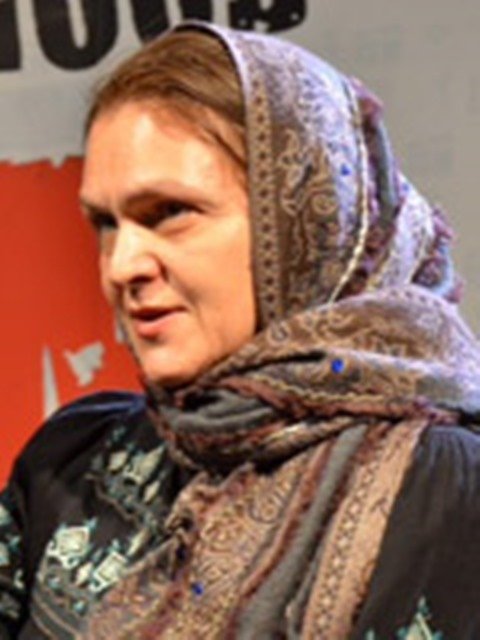Hamas doesn’t take action for any side in Syrian conflict - spokesman
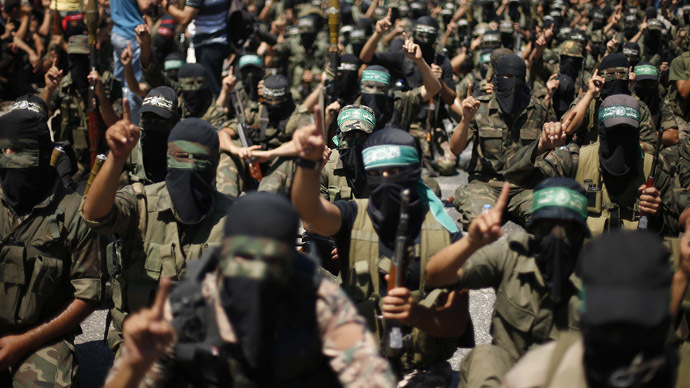
We believe that the Syrian people should decide on their future without any outside interference, Hamas’ representative in Lebanon Osama Hamdan says exclusively to RT’s Nadezhda Kevorkova.
Member of the Hamas politburo,
the organization’s representative in Lebanon, its spokesman and
negotiator Osama Hamdan says that Palestinian Sunnis are keeping
their alliances with Shia Hezbollah and Iran and, contrary to
what the media say, they don’t participate in jihadist operations
in Syria.
He is analyzing the consequences of the Syrian war and Russia’s role in the US’s decision not to bomb Syria.
RT:Dr. Osama, we are meeting in Dahieh [predominantly Shia-Muslim suburb south of Beirut, Lebanon – RT]…
Osama Hamdan: Yes, we are in Dahieh. All the rumors that we had left Dahieh or had been asked to leave Dahieh are only rumors. We’ve had relations with Hezbollah for over 20 years. And no one can break us up. So we are still in Dahieh.
RT:Who are these people or forces that try to break up Hezbollah and Hamas?
OH: Many different people. Some of them are the enemies who unfortunately consider themselves friends of Hezbollah or Hamas. I want to state clearly – the relations between Hamas and Hezbollah are the business of Hamas and Hezbollah. If people have ideas, suggestions or even critical comments about Hamas and Hezbollah, we are ready to hear them out. But no one can dictate what the relations between Hamas and Hezbollah are supposed to be like. This is for Hamas and Hezbollah, for their members to decide.
RT:There were media reports about the meetings between Hamas, Hezbollah, and Iran. Can we say that this is cooperation being restored?
OH: Hamas and Hezbollah, Hamas and Iran have never stopped meeting. Many would like to think that our relations fell apart. I have no desire to comment on these rumors and speculations. Meetings between Hamas, Hezbollah and Iran are not news, because these meetings take place regularly. Yes, Hamas leaders went to Tehran and there were a few meetings with the Hezbollah leadership. This happens all the time. People who think that our relations are getting worse see something intriguing in this. But we don’t see anything out of the ordinary here. This is normal.
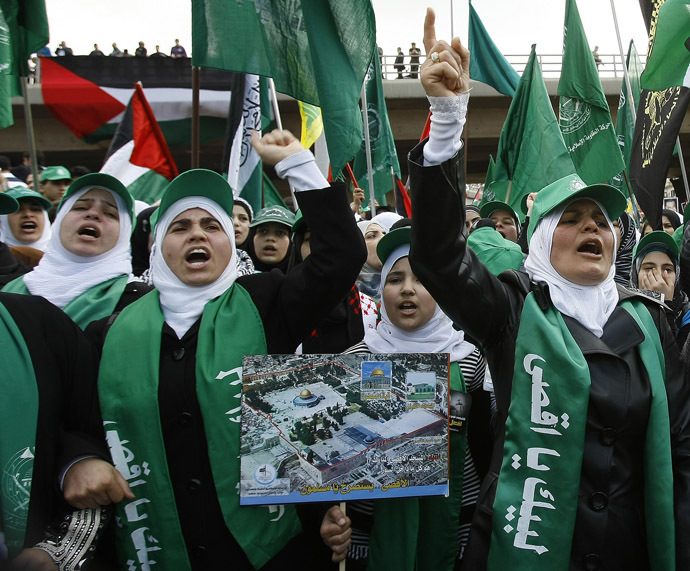
RT:Did Hamas leaders visit Tehran after the presidential election in Iran?
OH: Yes, after the election.
RT:What does Hamas think about the current situation in Syria?
OH: Hamas uses some basic principles in its relations with allies, friends and sometimes even enemies.
We don’t interfere with internal affairs of our allies. But we try to have good relations with both sides – the authorities and the people. We think our mission is to support both.
We don’t think we have the right to support one side in any country. We are with the country, and we are for stability in the region, supporting those who want to do the will of the people.
As for Syria, everybody knows that we have good relations with the Syrian government. These were very specific relations. When problems started in Syria in March 2011, we took a certain approach. We did everything we could to help our Syrian friends find a peaceful solution and start a political dialogue. We believe that the Syrian people should decide on their future without any outside interference. We did all we could for 10 months, trying to come up with solutions and ideas.
We respected the position of our Syrian friends, but we couldn’t go against our own political principles, it would’ve destroyed us politically. So we had to say that we couldn’t take sides. When the situation demanded that we made a choice, we left the country. We didn’t become anybody’s enemies, we just left.
And we explained to the Syrians why we were leaving and they understood our reasons – not after 10 months, but in the first two weeks. We released a statement saying that the Syrian government supported the Palestinian issue and Hamas, that we had good relations, we respected it, but we also respected the people and believed that everybody must respect the will of the Syrians.
We released the statement on April 2, 2011 and stayed in Syria for about 10 more months, until January 2012. During this time we did everything we could to help, but unfortunately our help was denied.
What is happening in Syria now is very sad. Towns destroyed, people killed, there is constant fire. We believe that it is up to the Syrian people to find a solution. It has to be a Syrian decision, not something imposed from the outside.
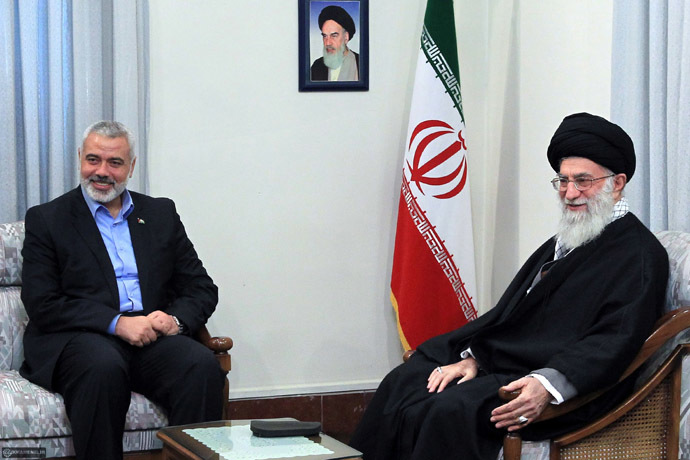
RT:Some media are circulating reports that allegedly some evidence was discovered after the battle in Al-Qusayr of Palestinian Hamas fighters having fought on the rebels’ and Al-Nusra Front’s side.
OH: This is a 100 percent pure lie. Some indeed are trying to circulate it, whereas we are open and transparent. If anyone asserts that Hamas people were fighting on Al-Nusra Front’s side they should tell us the names of these people.
It is way too easy to say that some Lebanese are collaborating with Al-Nusra Front, or that some Saudis are collaborating with Hezbollah, or that some Russians are fighting in Syria against Hamas, or against Hezbollah, or against the Armed Forces.
It’s way too easy to make any statements like these and simply say they are true without any proof behind them. It takes proof and evidence to substantiate claims. And the thing is that there is no proof in support of those allegations. Repeating some gossip many times over won’t make it any more real.
Hamas does not participate in action in Syria on any side. We believe it is not our duty to engage.
We believe that our duty is to oppose the occupation, and for that we need all the support we can get from people of Syria, Lebanon, Iran, all Arab people and the international community – we need their support to oppose the occupation and our enemy.
So we are not involved in the Syrian conflict on any side whatsoever.
And in principle, we are against bloodshed and violence as means of resolving any domestic conflicts. If people of a nation need to resolve some issues they should do so peacefully.

It is well-known that there is a huge difference between ideologies of Hamas and Al-Nusra Front, and therefore thinking that Hamas could have anything in common with Al-Nusra Front and even cooperate with them makes completely no sense at all.
Sadly, there are people who like to say things that make no sense and convince others to believe them.
We see our duty in opposing openly those who have occupied our land. We have made an open and clear statement that we are Palestinians, and if Syria were attacked by Israel we’d be fighting shoulder to shoulder with Syrians against the attackers as an external enemy that has occupied our land. Should the same happen to Lebanon, we’d also be ready to protect them – not as Hamas, but as Palestinians. We believe that no other nation should have to go through what we had to go through, i.e. the occupation. Al-Nusra Front is a completely different deal.
RT:How do you define Al-Nusra Front and what they are doing?
OH: They are fighting in Syria against Syrian people. They pursue false ideas. Their ideas are well-known and have nothing to do with ours.
Our goal, the goal of Hamas is to oppose the occupation and establish the Palestinian state that I’m sure will maintain a good relationship with the brotherly Arab and Islamic nations and the international community. The reason we are fighting the occupation is not for the sake of fighting. Not at all. We are only fighting because there is no other way to liberate our land. Over 20 years of the peaceful settlement process haven’t produced any results for the Palestinian people, thus the only way there is for us is to fight the occupation. This is what is happening in Lebanon, in the Gaza Strip, and sooner or later it will happen in the West Bank and in Palestine.
The lesson that history teaches us is that you can’t obtain freedom without fighting against the occupation.
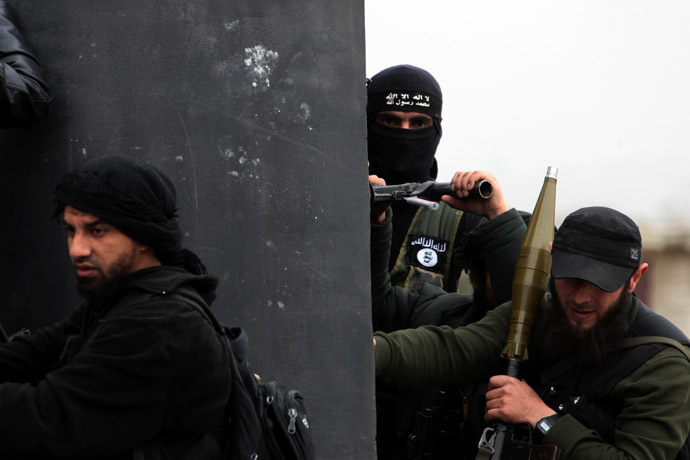
Russia did fight the Nazis. Russia didn’t give up despite the fact that the situation was often next to hopeless. Hundreds of thousands of the Russian people died fighting [according to Russian government figures, USSR losses within postwar borders now stand at 26.6 million – RT], yet you prevailed over the occupants. The same happened in Vietnam and anywhere in the world where people fought against the occupation. In cases like this, people have to sacrifice everything, but that’s the price of victory over the occupation. At the end of the day, after all the hardships and sacrifice, we will prevail. This is what we fight for as the Palestinian people. And we need help fighting. So why would we want to fight anyone instead of securing their help?
There many of those who like to accuse Palestinians of all sorts of things. Sometimes we need to speak up and refute the lies. I firmly believe that anyone making any statements must support them with evidence, otherwise they are nothing but lies.
RT:Why would anyone what to circulate this lie? There are forces who are consistently trying to make the entire world believe that Palestinians are fighting on the rebels’ side against their former allies i.e. Hezbollah and Syria. Why is that?
OH: Some forces are interested in promoting the idea of a religious war, be it between the state and the people, or between the Sunni and the Shia, or between Muslims and Christians. I believe that this is not the case, and I don’t believe there’s going to be a massive religious conflict.
Other forces have an issue with the relationship between Hamas and Hezbollah and they are trying to cause more trouble.
Still others seem to believe that they can make something happen by saying their wish many times.
However, I believe that words have no power unless they are backed by facts.
RT:Some are accusing Hamas of participating in bombings of the Sayyidah Zaynab Mosque in the suburbs of Damascus and helping those who besieged the mosque.
OH: It is no secret that right next to the Sayyidah Zaynab Mosque there is a refugee camp for Palestinians of the same name, the Sayyidah Zaynab camp. And it is no secret that Palestinians from that camp were the first victims of that incident and that they suffered more losses and damage than the Syrians.
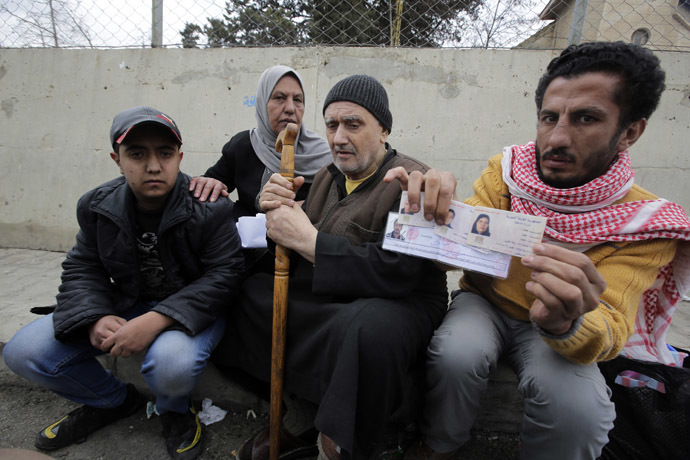
RT:Who did they suffer from?
OH: Unfortunately, from both sides. They were viewed as supporters of the rebels and as supporters of the regime at the same time by the parties to the conflict – while in fact the majority of Palestinians did not want to get involved at all. They have developed a good relationship with the people who come to pray at the Sayyidah Zaynab Mosque.
They have developed close connections with Syrians. Many of them are married to Syrians.
All we wanted to do is to keep our people out of the conflict – while both the conflicting parties criticized us for not joining the conflict on their side.
As for how the people were actually involved, all you’re going to find is that Palestinians were victims to that conflict, not fighters – and that’s what’s still happening across Syria.
RT:Still happening?
OH: Yes, the clashes between the conflicting parties
continue, and the Palestinians are caught in-between.
‘People failed to appreciate Russia’s position on Syria’
RT:What can you say about the use of chemical weapons in Syria?
OH: Until the investigation is completed, no one can say what really happened. But whoever it was it was a crime against humanity.
RT:If it was the rebels, how could they have obtained the chemical weapons?
OH: I do not know who was behind it – weather it was Syrian Army, or Free Syrian Army, or some other forces. This needs to be investigated.
RT:What do you think about Russia’ position on this situation?
OH: I can say that people failed to appreciate Russia’s position on the situation in the region.
RT:You mean that people would rather have the US bomb Syria?
OH: Of course not! I mean Russia’s overall position. No one has ever wanted the US to bomb Syria. We are completely against it. No one in the region would support the US bombings of Syria. If some party has issues with their government, that’s an internal business. But having an external intervention into the domestic conflict simply because there’s some party who wants to give you support by bombing your opponent – that’s totally unacceptable.
RT:Russia actually prevented this very possibility of bombing Syria, is it not how you look at this situation?
OH: You did the right thing if you prevented the US attack on Syria. But in all other instances we don’t want any interference in Syria’s internal affairs. So Russia was not interfering, but it prevented interference.
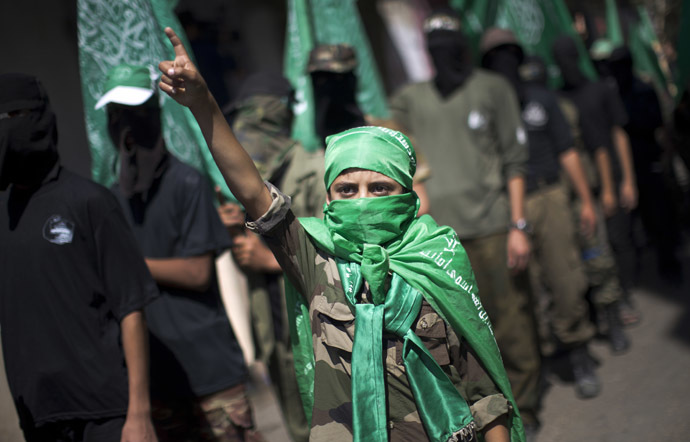
RT:Do you believe this is this the reason Russia is not popular among the people of this region?
OH: No. Our people were impressed by President Putin’s stance expressed in the following statement: “We are not defending the regime, we are defending the people of Syria.” I guess, had Russia explained its position more explicitly there would’ve been less misunderstanding and confusion.
Hamas didn’t want to be ‘part of the Syrian problem’
RT:Do you still have a chance of resuming the relations with the Syrian government if the situation changes?
OH: Actually, it’s not like we were good friends and then we stopped being friends. We wanted to avoid a conflict between supporting the resistance and supporting human rights in Syria. There shouldn’t be any conflicts here as these two principles go together hand in hand.
We left Syria because we didn’t want to be a part of the Syrian problem. As long as they respected our decision not to participate in this problem we accepted it. But when we were asked to participate in it we couldn’t stay there.
We’re not enemies. We’re talking about respecting the Syrian people, all of them, not just some of them. All we ask for is to respect our decision not be a part of the Syrian problem.
RT:Many people, particularly your enemies believe that the Syrian war pushed the Palestinian issue off the agenda. What’s your opinion of the Syrian war in light of this circumstance?
OH: The Israelis are free to do whatever they want. The more chaos and the less support for Palestinians, the more freedom they have. Indeed the Syrian situation has a negative impact on the Palestinian issue. That’s why we asked our Syrian friends to act as politically, peacefully and quickly as they can in order to finalize the situation, as its prolongation means more suffering for everyone.
RT:Don’t you have questions for such movements as Al-Nusra Front? They did invade Syria, but no such groups ever participated in fights for the Palestinians against the Israeli occupation. Why did that happen?
OH: It is a huge question. If anyone wants to fight an open fight they should go to Palestine and fight for the Palestinians against the Israeli occupation in Palestine.
RT:Maybe it’s worth inviting them?
OH: We aren’t inviting anyone. We’re resisting the occupation. Anyone supporting us and supporting freedom of people should know that we believe Israel is the most obvious apartheid system and the Palestinians are the most oppressed nation today. But it’s not really a question for us as to why one group or the other is doing something. They have their own ideas that I don’t accept.
When you do the right thing you will be rewarded. When you do the
wrong thing it will play against you. If you help the
Palestinians you will get your reward. The liberation of
Palestine will change the situation in the region, whereas a
continued occupation will increase the instability. So it’s up to
everyone to decide what exactly they want to support. If you
don’t want to see even more instability in the region you should
resist the occupation of Palestine; however if you want the
region to plunge into chaos you should be doing something else.
Nadezhda Kevorkova, RT
The statements, views and opinions expressed in this column are solely those of the author and do not necessarily represent those of RT.
The statements, views and opinions expressed in this column are solely those of the author and do not necessarily represent those of RT.
